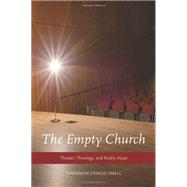The Empty Church Theater, Theology, and Bodily Hope
, by Craigo-Snell, Shannon- ISBN: 9780199827923 | 0199827923
- Cover: Hardcover
- Copyright: 6/6/2014
Why go to church? What happens in church and why does it matter? The Empty Church presents fresh answers to these questions by creating an interdisciplinary conversation between theater directors and Christian theologians.
This original study expands church beyond the sanctuary and into life. Shannon Craigo-Snell emphasizes the importance of liturgical worship in forming Christians as characters crafted by the texts of the Bible. This formation includes shaping how Christians know, in ways that involve the intellect, emotions, body, and will.
Each chapter brings a theater director into dialogue with a theologian, teasing out the ways performance enriches hermeneutics, anthropology, and epistemology. Thinkers like Karl Barth, Peter Brook, Delores Williams, and Bertolt Brecht are examined for their insights into theology, worship, and theater. The result is a compelling depiction of church as performance of relationship with Jesus Christ, mediated by Scripture, in hope of the Holy Spirit.
Liturgical worship, at its best, forms Christians in patterns of affections. This includes the cultivation of emotion memories influenced by biblical narratives, as well as a repertoire of physical actions that evoke particular affections. Liturgy also encourages Christians to step into various roles, enabling them to make intellectual and volitional choices about what roles to take up in society. Through liturgical worship, the author argues, Christians can be formed as people who hope, and therefore as people who live in expectation of the presence and grace of God. This entails a discipline of emptiness that awaits and appreciates the Holy Spirit. Church performance must therefore be provisional, ongoing, and open to further inspiration.
This original study expands church beyond the sanctuary and into life. Shannon Craigo-Snell emphasizes the importance of liturgical worship in forming Christians as characters crafted by the texts of the Bible. This formation includes shaping how Christians know, in ways that involve the intellect, emotions, body, and will.
Each chapter brings a theater director into dialogue with a theologian, teasing out the ways performance enriches hermeneutics, anthropology, and epistemology. Thinkers like Karl Barth, Peter Brook, Delores Williams, and Bertolt Brecht are examined for their insights into theology, worship, and theater. The result is a compelling depiction of church as performance of relationship with Jesus Christ, mediated by Scripture, in hope of the Holy Spirit.
Liturgical worship, at its best, forms Christians in patterns of affections. This includes the cultivation of emotion memories influenced by biblical narratives, as well as a repertoire of physical actions that evoke particular affections. Liturgy also encourages Christians to step into various roles, enabling them to make intellectual and volitional choices about what roles to take up in society. Through liturgical worship, the author argues, Christians can be formed as people who hope, and therefore as people who live in expectation of the presence and grace of God. This entails a discipline of emptiness that awaits and appreciates the Holy Spirit. Church performance must therefore be provisional, ongoing, and open to further inspiration.






